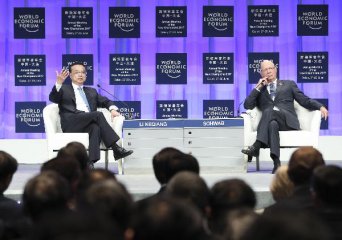
Highlight the 11th Annual Forum of the New Champions, Summer Davos
The world clock comes to Davos China time. International leaders are gathering in China's northeastern coastal city Dalian. Unlike previous years, this year’s theme is how to achieve inclusive growth in the promising yet challenging Fourth Industrial Revolution.
The three-day Annual Forum of the New Champions 2017 of the World Economic Forum is ongoing in Dalian, and will last till June 29. Its theme is “Achieving Inclusive Growth in the Fourth Industrial Revolution”. On the first day of the meeting, a great number of guests mentioned artificial intelligence (AI), big data and cloud computing, saying that these technologies are promoting the development of digital economy and creating new industry forms.
An industry insider told the Shanghai Securities News that innovation has opened the lock of growth, bringing driving force for the sustainable growth of the world economy.
From AI, big data and cloud computing to booming digital economy
From handwriting to computer input, data has continuously broken barriers along with the course of human history. IBM Greater China president Chen Liming pointed out on June 27 that people are now in a world of data explosion.
For example, it took 50 years for the data on medical treatment and health to double in 1950s, and 7 years in 1980s, but only 3 years in 2015. It expects that it only needs 73 days for the data to double by 2030.
To deal with large amounts of information, Chen Liming believed there should be new subversive technologies. "In this sense, cloud computing, bit data, cognitive computing and AI should play a vital role in it," Chen said.
PricewaterhouseCoopers confirms the tremendous potential of AI in a report. It noted on June 27 that by 2030, AI will contribute 15.7 trillion US dollars of the world economy. The number is even higher than the sum of the current economic aggregate of China and India. In view of geographical distribution, China and North America are expected to become the biggest beneficiaries of AI, and will earn a profit of a total of 10.7 trillion US dollars.
Coincidentally, Accenture also predicted in a latest report that when the AI becomes a new factor of production, but not just a tool to improve productivity, it will have the potential to bring opportunities for huge growth of China’s economy. By changing the way of working and developing new value and growth sources, AI is expected to drive up the growth rate of China’s economy from 6.3 percent to 7.9 percent in 2035. The report also finds that as AI can help employees use time more effectively, it is expected to make China's labor productivity up 27 percent by 2035.
The view brought by new technologies is three-dimensional. Inspur Group Chairman and CEO Sun Pishu pointed out that AI, big data and cloud computing are promoting the development of the digital economy. Sun added that the digital economy has brought a lot of changes, and lying in the core of change is computing. Cloud computing makes the cost of computing lower and lower, resulting in a variety of big data.
Sun also pointed out that data is not only the core of trade and business activities, but also the core of intelligent city construction. Data sharing and opening can also help the government to manage the city.
China is becoming the world innovation center
Klaus Schwab, Founder and Executive Chairman of the World Economic Forum, said that one of secrets of China's economic growth is the “mass entrepreneurship, mass innovation” initiative. These economic concepts together shape the future of mankind. China has demonstrated the ability to lead the Fourth Industrial Revolution over the last year.
"China is becoming one of the greatest innovation centers in the world," Huang Aiai, member of the global executive committed of the world's leading law firm, Baker McKenzie, told the SSN on June 27.
She pointed out that via innovation, people are likely to witness the extraordinary progress of China in the middle of this century, especially in the field of clean technology and renewable energy. If China can make good use of these achievements when developing infrastructure projects for the Belt and Road, China will leave a rich legacy for future generations.
Baker McKenzie recently surveyed 150 corporate leaders in the Asia-Pacific region. 60 percent of companies surveyed have business in China. Urgent need for innovations in companies and adoption of new technologies are the number one problem faced by enterprises. Most respondents expect that their companies will be hit by technology competition in two years.
Innovation has brought industrial upgrading. Zhou Ye, chairman and president of China’s leading financial service provider ChinaPnR, told the SSN that owing to AI, big data and cloud computing, the financial industry has a different risk control technology. The mode of its connection with clients has also changed. The service platform, product and trading mode are also different from the past. “With the development of AI, big data and cloud computing, I become increasingly aware of the emergence of new finance,” Zhou said.
For the transportation industry, thanks to the AI, big data and cloud computing technology, sharing travel has benefited hundreds of thousands of travelers in China. Liu Qing, president of Beijing Xiaoju Technology Co., Ltd., said that the world is now at the turning point of the fourth Industrial Revolution. Technology and the Internet has not only connected all industries but also deeply transformed them. The transportation industry is undergoing three major changes: electrification, automation and sharing, which will completely change the industry.
New Industrial Revolution creates new vitality
In the view of State Grid Corporation Chairman Shu Yinbiao, two of the previous three industrial revolutions were led by energy, and the energy industry will still play a leading role in the fourth Industrial Revolution. The new round of energy revolution will promote the industrial revolution. The energy revolution includes a revolution not only in production mode and way of consumption but also in technology and the energy system.
Shu pointed out that the energy revolution will eventually transform the industry from one relying on traditional fossil energy to one relying on non-fossil energy. The substitution is the most urgent and important issue confronting the society today. Shu believed that the development of electric vehicles will be an important part of the development of new energy.
Lin Boqiang, chairman of China Institute for Studies in Energy Policy, Xiamen University, told the SSN that the word new in the new energy economy is reflected on clear and low-carbon. It has to make continuous exploration of new technologies to solve the problem of clean and low carbon. In the future, energy storage technology and shale gas are the most promising subsectors and have the highest value in the energy field. Without energy storage technology, wind power and other new energy may not go far. Shale gas will become a useful supplement to natural gas. It needs the government and enterprises to increase investment and support for it.
Lin also said that currently natural gas accounted for slightly over 6 percent in China’s all energy consumption. According to the 13th Five-Year Plan, the figure should reach 10 percent. To achieve the goal, China’s natural gas consumption must grow 15-16 percent annually in the next four years. Therefore, it needs to develop shale gas to meet market demand.
Translated by Coral Zhong






















Latest comments